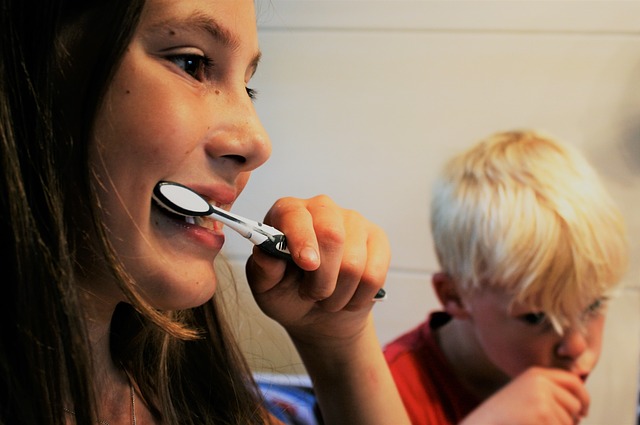As a parent myself I know just how much of a nightmare it is trying to get kids to brush their teeth properly. No matter how many times you try and drum it into them about how important it is to keep their teeth clean, that they must do it for at least two minutes and to not swallow the toothpaste or use half a tube’s worth for that matter, they still faff around. Every… single…time!
My two are now 9 and nearly 11 and although they are very much in the habit of brushing their teeth morning and night and they regularly visit the dentist for check ups, they still don’t brush as good as they should. My eldest has just had braces fitted and so it is more important than ever that he cleans his teeth properly to ensure any food particles are removed from between the braces. So far, so good and he’s taking it very seriously, even taking a pack of interdental brushes to school with him to clean his teeth after lunch. Whilst I know both of them could definitely do with upping their game, I do take solace in the fact that their teeth do at least come into contact with a toothbrush and toothpaste two times a day.
Shockingly in a report published in the Independent, nearly a third of parents in the UK wait until their children have all their milk teeth before taking them to the dentist and a quarter of adults think that it doesn’t matter if their kids develop cavities in their baby teeth. It is a common misconception that milk teeth don’t really matter, that because they are not permanent it doesn’t matter if you they’re not looked after as much as adult teeth. But this couldn’t be further from the truth, because aside from the fact that not only does it teach children bad habits from a young age, but milk teeth are also more important than many may realise. Milk teeth are essentially markers or placeholders for adult teeth and they help to align and space things out ready for when those teeth make an appearance. For this reason it is so incredibly important to start good oral hygiene practices from an early age.

When should I start cleaning my baby’s teeth?
Babies’ teeth grow at different rates, and so whereas one baby may cut their first teeth at say one month old, another may not get theirs until they are 6 months or more. A very few number of babies are even born with teeth so as you can see there is no one size fits all approach to when your baby will get their first tooth. However, the advice for when to start cleaning your baby’s teeth remains the same – once the first tooth appears, that is the time to start.
How do I clean my baby’s teeth?
There are a few different ways you can introduce tooth brushing to your baby and it’s always best to go with what your baby feels comfortable with. Their gums are likely to be sore and so a gentle approach is probably best. Always make sure you use a toothbrush designed for babies as these have softer bristles and a smaller head. Or you could try using a silicone finger toothbrush, which slips over your finger and you may find easier to control.
If your baby doesn’t like you brushing their teeth try giving them the toothbrush to hold so that they are in control. It is highly likely they will chew it, as babies pretty much bung anything in their mouths given the chance and they especially like chewing things when they are teething. This is a good thing though as it will get them used to having a toothbrush in their mouth, just remember to replace it as soon as the bristles start to splay.

Obviously there will come a time when you’ll need to clean their teeth for them and if they still don’t like you doing it try sitting in front of a mirror with your baby on your lap facing away from you. This should hopefully distract them enough and leave you in a good position to reach inside their mouth. You can check out some other good distraction techniques a bit further down 😉
In terms of toothpaste, always check the packaging as this will have a recommended age on it and only use a very small amount so that you limit how much your baby swallows. As a general rule you should use a tiny smear of toothpaste for babies and toddlers up to 3 years old, and a pea-sized amount for children aged 3 to 6 years.
Brush the teeth in small circles, making sure to gently brush the gums as well and just like adult teeth make sure this becomes a twice daily habit – once in the morning and again before going to bed.
We are very fortunate to have the NHS in the UK and this also applies to dental care, so be sure to take advantage of a free dental consultation and take your baby to the dentist as soon as you possibly can. The best way to get your baby used to the dentist is by taking them along to your own appointments. This way they get used to the dental environment; the smells, the sounds etc. and as they grow up it will lessen the chances of them developing a fear of visiting the dentist.
If you yourself get anxious about going to the dentist, it would be advisable to ask someone you know, perhaps your partner or a grandparent, if they could take your child with them instead. Otherwise there is the risk that they will pick up on your fears and develop their own
Tips and tricks to get your baby/toddler/child to brush their teeth
Whilst I don’t think it is entirely a good idea to be playing games when cleaning your teeth, there comes a time when needs must and if you are struggling to get your child to brush their teeth then here are a few handy tips to try out:
-
-
- Set a good example – Kids copy what they see so make sure they see you cleaning your own teeth and be sure to do a good job!
- Play music – Pick a song that’s roughly 2 minutes long and see if they can brush their teeth to the beat. You could also use your own toothbrush as a microphone to get some laughs, just make sure some tooth brushing actually goes on too!
- Singing Dentist – In a similar vein, check out the Singing Dentist on YouTube. He makes parodies of popular songs based on all things related to teeth. Very funny and my two absolutely love it.
- Reward chart – Ahhh the good old reward chart, what a child won’t do to get a sticker eh? Doesn’t need to be anything fancy, just a bit of card stuck on the bathroom wall and for every time your child does their teeth properly they get a sticker. Simples.
- Novelty toothbrush – You can buy some toothbrushes that have characters on them, some play music, some light up, whatever you choose a gimmick is a powerful tool. Use it and abuse it!
- Brush Teddy’s teeth – Get your child to brush their favourite teddy or doll’s teeth so that they can take on the roll of parent. Kids love a bit of role play and if they feel as though they’re the ones in control and that they have to set a good example they’ll be brushing their teeth in no time.
- Praise – Whenever your child brushes their teeth well always remember to say well done and give them a big cuddle. Children love to be praised and know that they have done something well and if they think they are good at something they are way more likely to do it again in future.

Your child will need help from you to clean their teeth right up until the age of about 7. Sure they’ll be able to do it themselves, but they’re unlikely to be doing it properly and will need supervision. The time you invest in the early education of good dental care with your children will be hugely beneficial to them as they grow older and so caring for those baby teeth is just one of the many responsibilities you will have as a parent.
*collaborative post
-




































When should I first take my baby to the dentist?